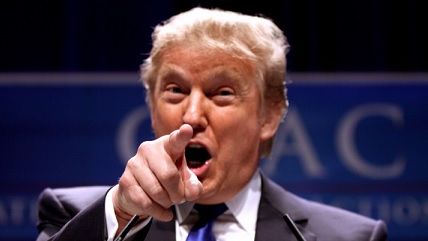The Basket Case for Smaller Government
Has the possibility of a Trump presidency caused progressives to reflect on the wisdom of an all-powerful State?

We are now well into the season of knee-jerk partisan cheerleading, and knee-jerk partisan cheerleading has an inverse relationship to introspection. So the many liberals who now insist Hillary Clinton's comments about the "basket of deplorables" supporting Donald Trump was on the money probably won't stop to consider the implications for their own agenda.
They might have reason to later, though.
On Friday Clinton said roughly half of Trump's supporters are "racist, sexist, homophobic, xenophobic, Islamophobic?—?you name it." Right now Trump has about 43 percent of the electorate in his corner, which means the percentage of Americans who are, in Clinton's view, deplorable stands at a little more than one-fifth.
Trump has roundly denounced Clinton for insulting the character of the humble, honest, hard-working, God-fearing and pure-of-heart Americans who support his campaign. But Clinton's defenders point to voluminous polling data demonstrating that sizable percentages of Trump's voters think blacks are lazy, violent and less intelligent; would support banning both Muslims and LGBTQ people from the U.S.; are skeptical of diversity; wish the South had won the Civil War; believe (incorrectly) that immigrants commit more crime, and so on.
Those are alarming indicators. And they grow more alarming when you note that in recent weeks the presidential race has tightened. Clinton's lead, once in the double digits, has shrunk to about 3 percentage points. And that narrow lead does not account for the possibility of the Bradley/Wilder effect.
Both Tom Bradley (a Los Angeles mayor) and Doug Wilder (a Virginia lieutenant governor) enjoyed solid leads in the polls during their gubernatorial races. Bradley lost, and Wilder barely squeaked to victory. One explanation, based on social desirability bias, holds that some voters told pollsters they would vote for Bradley (or Wilder) because they thought supporting the black candidate would sound more acceptable than supporting his opponent.
Although there is no hard evidence to support the notion, some voters who plan to vote for Trump might be telling pollsters otherwise, simply because Trump elicits so much hostility. And if there is such a Trump effect, then Clinton's comments could make it worse. Who wants to be thought of—even by a pollster—as a deplorable racist?
It would not take much (one more health scare, for example) for Trump to pull ahead and stay there. That increases the probability of a Trump administration from non-zero to significant.
The prospect of President Trump wielding the levers of power should strike fear into even the stoutest heart. But it also should lead liberals and progressives to question their zeal for a government of unlimited power.
Once upon a time, they did. During the George W. Bush administration liberals routinely bewailed the manner in which the executive branch stomped past the boundaries imposed by the Constitution. In those days you were nothing if your Prius did not sport a sticker comparing Bush to Hitler or asking, "Is it fascism yet?"
All of those lofty concerns vanished on January 21, 2009, and it wasn't long before progressives were cheering Barack Obama's use of his pen and phone and listing ways the president could "get things done" unilaterally. The Affordable Care Act expanded government power even further, enabling Washington for the first time to require American citizens to purchase a consumer good as a condition of being alive in the U.S.
Trump would make Bush and Obama look like wallflowers. He unabashedly believes government should do things such as seize private property through eminent domain, force religious minorities to register with the state and forbid private employers to hire certain types of people (such as those without proper immigration documents).
Should Trump win, his administration would not be populated with the principled conservatives who opposed his candidacy. It would be populated with ardent Trump supporters—including some of the racist, sexist, homophobic, xenophobic, Islamophobic deplorables Clinton denounced on Friday. They would inherit the most powerful executive branch in U.S. history and try to make it more powerful still.
As Charles Cooke wrote a while back in National Review, this ought to prompt some reflection among liberals. Has Trump's rise, he asks, "done anything to change your mind as to the ideal strength of the State?"
To be fair, a similar question could be put to advocates of limited government. While it's pretty to think America has moved beyond its bigoted past into a post-racial Utopia, the polling data on Trump's supporters suggest otherwise. And that suggests in turn the need for at least some government intervention to protect the rights of racial, religious and other minorities.
Still, for all the harm bigotry can do in the private sector, that harm is constrained by the limited scope of private authority. Acme Widgets might decide not to hire Muslims—but Acme can't set hiring policy for its direct competitors, let alone every other actor in the marketplace.
Washington can.
This column originally appeared at the Richmond Times-Dispatch.


Show Comments (173)